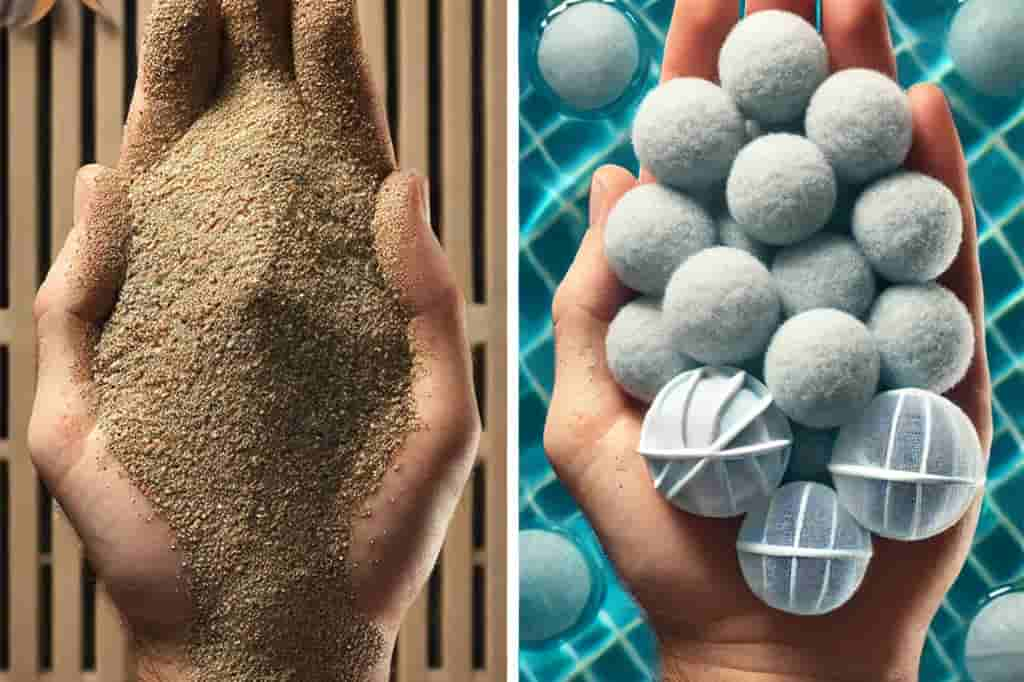If you’ve ever owned or maintained a swimming pool, you know that keeping the water crystal clear and inviting can be a labor-intensive task. At the heart of a clean pool is an efficient filtration system, which traditionally relies on sand to trap dirt and debris. However, a new contender has entered the market—pool filter balls. These tiny, lightweight balls are rapidly gaining popularity, but the question remains: are pool filter balls better than sand? Let’s dive into the details and find out!

What Are Pool Filter Balls?
Pool filter balls are an innovative filtration media designed to replace traditional sand in pool filters. Made from polyethylene fibers, these small, fluffy balls offer a range of benefits that make them an appealing alternative to sand. Unlike sand, which can be heavy and cumbersome, pool filter balls are lightweight and easy to handle. They work by trapping dirt, debris, and even oils as water passes through them, keeping your pool water clean and clear.
The Advantages of Pool Filter Balls
1.Superior Filtration:
One of the most significant advantages of filter balls is their superior filtration capabilities. Traditional sand filters can only capture particles as small as 20-40 microns. In contrast, pool filter balls can filter out particles as small as 5-10 microns. This means cleaner water with fewer contaminants, resulting in a more pleasant swimming experience.
2.Ease of Use:
Pool filter balls are incredibly easy to use. They are much lighter than sand, making them easier to transport and install. Furthermore, because they don’t require backwashing like sand filters do, maintenance becomes a breeze. Simply rinse the balls with a garden hose, and they’re ready to go again. This not only saves time but also conserves water.
3.Longevity:
Pool filter balls typically last longer than sand. While sand might need to be replaced every 3-5 years, filter balls can last up to 5-8 years with proper care. This extended lifespan means fewer replacements and potentially lower long-term costs.
4.Environmental Impact:
Using pool filter balls can be more environmentally friendly than sand. They don’t require as much backwashing, which reduces water waste. Additionally, because they are reusable and have a long lifespan, they generate less waste over time.
5.Improved Water Flow:
Pool filter balls allow for better water flow through the filter system. This enhanced flow not only improves filtration efficiency but also reduces the workload on your pump, potentially extending its life.
Comparing Pool Filter Balls to Sand
While pool filter balls have many advantages, it’s essential to compare them directly with sand to understand their benefits fully.
1.Filtration Efficiency:
As mentioned earlier, pool filter balls can filter out much smaller particles than sand, leading to clearer water. If your pool is prone to fine debris or you’re looking for the clearest water possible, filter balls might be the better choice.
2.Weight and Handling:
Sand is heavy. A typical sand filter can hold hundreds of pounds of sand, making it difficult to transport and install. Pool filter balls, on the other hand, are lightweight and easy to handle. A few pounds of filter balls can replace a hundred pounds of sand, making the installation process much less strenuous.
3.Maintenance:
Sand filters require regular backwashing to remove trapped dirt and debris, which wastes water and can be time-consuming. Pool filter balls eliminate the need for backwashing, as you can easily rinse them out and reuse them. This not only simplifies maintenance but also reduces water consumption.
4.Cost:
While pool filter balls may have a higher upfront cost than sand, their longevity and lower maintenance needs can make them more cost-effective in the long run. You’ll save money on water, replacement sand, and potentially even pump repairs due to less strain on your system.
5.Longevity:
Sand tends to degrade over time, leading to less efficient filtration and the need for replacement every few years. Pool filter balls, however, are designed to last longer, maintaining their filtration efficiency over time.
Potential Drawbacks of Pool Filter Balls
Despite their many benefits, pool filter balls aren’t perfect. Here are a few potential drawbacks to consider:
1.Initial Cost:
Pool filter balls can be more expensive than sand upfront. While they may save money in the long run, the initial investment might be a concern for some pool owners.
2.Compatibility:
Not all pool filter systems are compatible with filter balls. It’s essential to check whether your system can accommodate them before making the switch.
3.Cleaning Frequency:
While pool filter balls don’t require backwashing, they still need to be cleaned periodically. Some users may find that they need to clean the balls more frequently than they would backwash a sand filter, depending on their pool’s conditions.
4.Degradation:
Over time, filter balls can become compacted or lose their shape, which might reduce their filtration efficiency. Regular inspection and cleaning are necessary to maintain optimal performance.
Should You Switch to Pool Filter Balls?
Deciding whether to switch from sand to pool filter balls ultimately depends on your specific needs and preferences. If you’re looking for a filtration media that offers superior filtration, is easier to handle, and requires less maintenance, pool filter balls are an excellent option. They’re particularly beneficial for pool owners who want the clearest water possible and are willing to invest a bit more upfront for long-term gains.
On the other hand, if you’re satisfied with your current sand filter’s performance and don’t mind the regular maintenance, sticking with sand might be the better choice for you. Sand is a tried-and-true filtration method that has been used for decades, and it continues to be effective for many pool owners.
